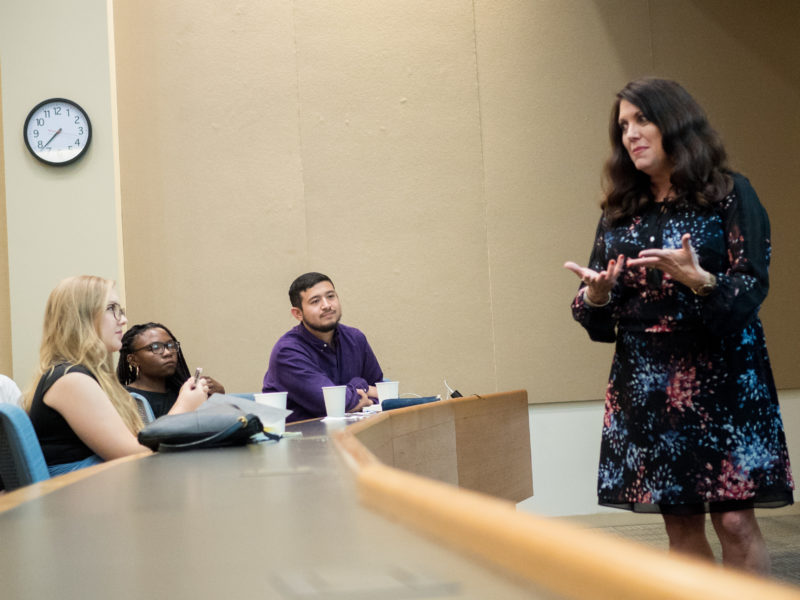Wendy Rigby, biomedical reporter and alumna, addressed approximately 15 Trinity students “” most of whom were members of the Chemistry Club “” on Wednesday evening. Rigby focused on how to communicate scientific research to the public.
Rigby’s appearance was made possible by the Trinity Chemistry Club and the department of communication. Rigby boasts a 25-year career in broadcast journalism, of which she spent 20 years at KENS-TV, the local CBS affiliate, where she covered health and medical news. She reported on the same subjects for Texas Public Radio for five years, before taking a job with Texas BioMed as the media and communication specialist this September.
Rigby graduated from Trinity summa cum laude in 1983 with a degree in print and broadcast journalism. Yesterday, she announced that she was accepted to an online program at Johns Hopkins University to receive her master’s degree in communication.
Rigby had a lot of advice for students majoring in a science who may need to talk to journalists about their research some day.
“For a scientist, you need to turn your writing background around. When you’re trying to get your message out to the public, you need to reverse how you might write a research paper and start with the results and then move on to the details,” Rigby said.
Rigby recommended that researchers “speak English” when describing their research, emphasizing the importance of acknowledging the public’s intelligence.
“Don’t underestimate what people want to know because listeners and viewers are more educated and interested than ever before. You have to make it understandable, but don’t talk down,” Rigby said.
Julia Matsuo Dapaah, senior biochemistry and molecular biology major, found these aspects of Rigby’s talk very helpful.
“Communication and science is something we should be mindful of, because you can have all the science but you need someone to be able to tell the public,” Matsuo Dapaah said. “But it’s a challenge. You never know how much detail to go into, how much you should dumb down the science.”
Maya Ewens, sophomore psychology major and vice president of social media for the chemistry club, also found Rigby’s talk informative.
“I was interested about hearing about the research that she does, as well as the journalism that goes into it, which we don’t hear much about,” Ewen said. “I took away that writing is more important than people think in science. It’s not just research.”
Rigby also had advice for aspiring journalists.
“It’s important to use writing, video and audio. You can just be a writer, but that doesn’t mean you won’t have to speak to people. The more you know how to do, the better off you’ll be in the future,” Rigby said. “You have to communicate with people from the CEO to the homeless man on the street. You can’t bring your own bias into it. I’m not Wendy Rigby; I’m Texas BioMed.”
Despite her presence in the science field, Rigby does not have a science background, and she does not think that a background is necessary.
“I don’t think a science background is necessary for scientific reporting. I think it’s necessary to have good communication skills, basic understanding and a need to learn. Eighty percent of what I’ve learned has been on the job. It’s like getting a degree while I work,” Rigby said.
Rigby also promoted the benefits of a liberal arts education.
“You need to find a way to combine your strengths and skills with your passion. I loved my liberal arts education because it allowed me to walk into a newsroom at the age of 21 and say “˜I know about that,’ “ Rigby said.







